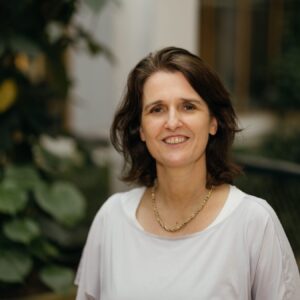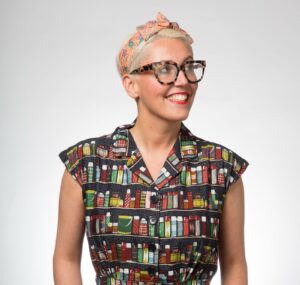
Paola Grosso
Paola Grosso (Member, IEEE and ACM) is a Full Professor at the University of Amsterdam with a chair on “Multiscale networks”. She is part of the Multiscale Networked Systems research group and director of the Informatics Institute. Her research focuses on the creation of sustainable and secure computing infrastructures, which rely on the provisioning and design of programmable networks. Current interests cover developments of control planes for quantum networks, in band telemetry and use of FPGA for enhanced network monitoring. She has an extensive list of publications on these topics and currently contributes to several national and international projects such as the EU-funded projects DESIRE6G, SLICES-RI, as well as international initiatives like FABRIC.
Keynote title: Network control in the Responsible Internet
Network communication underpins the fabric of our society, and we are witnessing ever-increasing demands for security of networked applications and autonomy of network infrastructures. These demands have highlighted the need for increased control and insight over data streams. In my talk I will discuss how the networking research community has tackled this problems and highlight how these developments can increase users’ trust in the Internet operations”.
Raffaele Montella
Raffaele Montella is an Associate Professor with tenure in Computer Science at the Department of Science and Technologies (DiST), University of Naples “Parthenope’” (UNP), Italy. He got his degree (MSc equivalent) cum laude and an award mention to his study career in (Marine) Environmental Science at the University of Naples “Parthenope” in 1998, defending a thesis about the “Development of a GIS system for marine applications”. He defended his Ph.D. thesis on “Environmental modeling and Grid Computing techniques” earning a Ph.D. in Marine Science and Engineering at the University of Naples “Federico II”. His main research topics and scientific production are focused on: tools for high-performance computing, cloud computing, and GPUs with applications in the field of computational environmental science (multi-dimensional geo-referenced big data, distributed computing for modeling, and scientific workflows and science gateways) leveraging on his previous (and still ongoing) experiences in embedded, mobile, wearable, pervasive computing, and Internet of Things. Since 2021 he has been head of the UNP node CINI Lab/Working Group “HPC: Key Technologies and Tools”. Since 2022 he has been the head of the AWS Academy at the University of Naples “Parthenope”. In February 2023, he gained the Italian National Academic Qualifications as Full Professor in Computer Science (01/B1).

Keynote Title: Predicting Farmed Seafood Bacteria Contamination with HPC and AI: a success story
Scientific workflows that process vast amounts of data using distributed high-performance computing (HPC) systems or on-demand computational resources have become a well-established and reliable paradigm in data science. Among these, the orchestration of environmental models for simulations and forecasting represents one of the most widely adopted routine production workflow applications. This keynote speech explores our vision of workflows as fundamental building blocks for environmental applications, integrating numerical modeling with artificial intelligence to enhance environmental forecasts and predictions. At the HPSC SmartLab of the University of Naples “Parthenope”, we have developed DagOnStar, a workflow engine designed to orchestrate environmental models used by the Center for Monitoring and Modeling Marine and Atmosphere (CMA) in generating weather and marine forecasts. One of HPSC Laboratory’s operational workflow applications (the MytilEx project founded by the local government of the Campania Region) focuses on predicting E. coli contamination in farmed mussels. This system enhances pollutant transport and diffusion forecasts (using the WaComM++ model) by incorporating an artificial intelligence component (AIQUAM++ model), which has been trained on microbiological measurements. The initial evaluation of the system demonstrates its ability to predict E. Coli presence with over 90% accuracy, marking a significant advancement in leveraging computational intelligence for environmental and food safety applications. The same building blocks used to implement the MytilEx project have been used to implement two more projects. The first is the ongoing MytilX project (founded by the Istituto Zooprofilattico Sperimentale dell’Umbria e delle Marche “Togo Rosati”). Its early experimental results demonstrated that the MytilEx success story can be replicated on other sites. The second project, SmokeTracer, is an on-demand HPC application funded by the local government of the Campania Region. The project is used to compute the possible contaminated soil footprint in case of wildfires or arson. SmokeTracer is implemented partially, reusing the DAGonStar implemented building blocks.

Rosa Filgueira
Dr. Rosa Filgueira is a Chancellor’s Fellow in AI & Data Science at EPCC, University of Edinburgh, specializing in intelligent adaptive systems, semantic software analysis, and text-based data insights. Her research focuses on empowering non-experts to use complex computational tools effortlessly, enhancing software understandability through AI techniques, and advancing innovative parallel frameworks for scalable, efficient, and reproducible stream-based applications. She has collaborated across diverse domains, including seismology, social sciences, and digital humanities, applying cutting-edge NLP, machine learning, and parallel computing techniques. Rosa has significantly contributed to major projects such as the development of the dispel4py and Laminar frameworks and the Frances Semantic-Web platform for historical data mining. She has chaired several conferences and workshops, including IEEE eScience conference 2023 and WORKS workshops from 2020 to 2022, and served as the Track Chair of the Data Analytics, Visualization, and Storage track at SC24. She is also a UK Young Academy Fellow, an SSI Fellow, a member of the IEEE eScience Steering Committee, an Associate Editor for the Royal Society Open Science journal, and a GAIL Fellow at the University of Edinburgh. Rosa actively works on interdisciplinary research at the intersection of AI, HPC, and semantic technologies.
Keynote title: The Unexpected Journey: From Low-Level MPI Optimizations to Stream-Based Frameworks for Scalable Parallel Processing
In her keynote, Rosa reflects on an unexpected journey—one that began with low-level MPI optimizations, such as adaptive compression techniques and collective I/O strategies and led to the development of dynamic and serverless stream-based frameworks for large-scale scientific computing. Initially focused on fine-tuning data movement in tightly coupled HPC systems, her research evolved as the challenges of modern computational science demanded greater flexibility, automation, and scalability. Today, these stream-based frameworks, including dispel4py and Laminar, enable efficient stream data processing across HPC and cloud environments. By incorporating abstract task definitions, automatic parallelization techniques, dynamic deployment strategies, semantic code search, and automated workflow descriptions, these frameworks redefine how scientific stream-based workflows are designed and executed. Drawing on real-world applications in seismology and astrophysics, this keynote explores how rethinking traditional HPC paradigms has led to scalable, efficient, and accessible solutions—transforming the way computational science is conducted.
Sanzio Bassini
Director of Supercomputing, Application and Innovation Department of CINECA, Italian Interuniversity Consortium. Over the years he has been Vice Chairman of the European Technology Platform for HPC AISBL 2012 – 2014 and Council Chairman of PRACE – Partnership for Advanced Computing in Europe in the period 2014 – 2017. After participating in the international working group for the establishment of the EuroHPC Joint Undertaking, he is the leader of the Italian Pre-Exascale Leonardo Project. Since last march 2021, he cover the role of Technical-Scientific Director of Big Data and Artificial Intelligence for Human Development International Foundation. In September 2022 he is been nominated the leader of the spoke digital infrastructure of the national Foundation for High Performance Computing, Big Data and Quantum Computing. He is actually Chairman of the Big Data Association and leader of the It4lia project, Italy for Artificial intelligence, the project for the implementation of the national AI factory.


